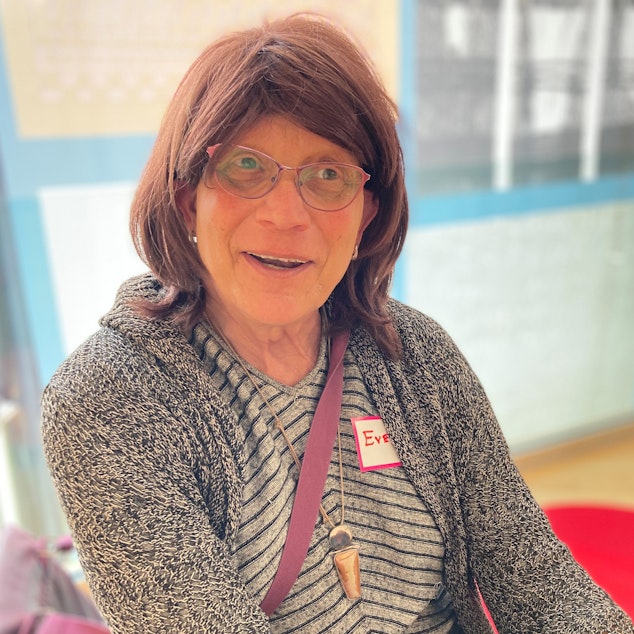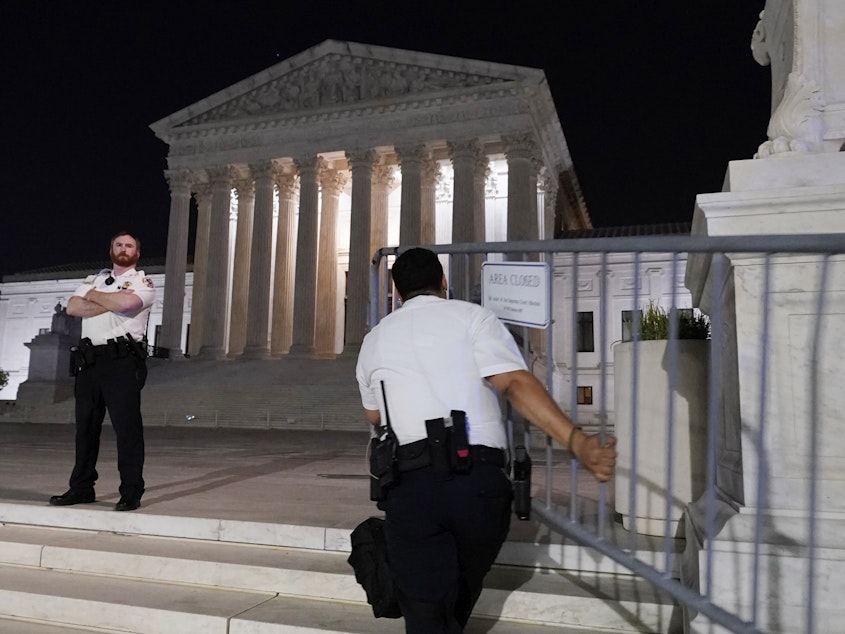Has smoking fentanyl been legal this whole time?!: Today So Far

- Federal Way is considering a new local law that will make smoking fentanyl in public illegal. Isn't that already illegal?
- Meanwhile, a group of Washingtonians are working to get Initiative 1922 on the ballot. It aims to decriminalize all drugs in Washington state.
- And Edmonds is considering a new law that will make public camping illegal. Here's how.
This post originally appeared in KUOW's Today So Far newsletter for May 3, 2022.
The Federal Way City Council is considering a new local law that would criminalize smoking fentanyl in public. Federal Way Mayor Jim Ferrell initially requested the ordinance, noting that he has heard stories of people smelling the drug wafting through buses. I have to admit, I can relate to that. Riding the bus in Portland is the reason I know what meth smells like.
But this also begs a certain question: Has smoking fentanyl been legal this whole time!? Have we all been talking about addiction and related issues around here and never noticed that it was legal to smoke these drugs in public? OK, there's probably a little sarcasm in that last statement. But just in case it needs to be said: smoking fentanyl is already illegal. It's against federal law. So what exactly is the point in Federal Way? The city is basically adding jail time and fines on top of federal consequences by making it a local misdemeanor. If someone smokes fentanyl within 10 feet of people in public, or within an enclosed public space, like a bus, they could get one year in jail or up to $5,000 in fines. Read the full story here.
In another corner of Washington, a group is attempting to decriminalize drugs. Washingtonians are pushing to get Initiative 1922 on the November ballot, which would knock down state laws and penalties around the possession of drugs.
"Criminalization has not worked," Everett Maroon, a drug treatment professional in Walla Walla, told KUOW. "It's time for us to walk away from that as a solution."
One important point: I-1922 would not legalize drugs. This has more to do with how law enforcement interacts with drug laws. While the drugs would remain illegal, a person would not run afoul of the law for simply possessing them. Police would still be able to seize illicit drugs. The initiative also proposes $141 million in state funding (which would come from cannabis taxes) for prevention and drug abuse treatment. Supporters have until July 8 to collect nearly 325,000 signatures to get the initiative on the ballot. Read more here.
Sponsored
Over in Edmonds, the City Council is considering a new law of its own — making it illegal to camp in public. If your sense is that this has more to do with homelessness than it does "camping," you are correct. According to a proposed ordinance, it would be illegal to camp in public areas, along sidewalks, etc. if shelter has been offered. If this sounds familiar, that's because this sort of law has been tossed around before, and the inevitable debates have gone around, too. This goes back to a case that originated in Boise a few years ago. In short, the resulting case law states that a city cannot make it illegal for a person to sleep in public if that city does not have a shelter for them to go to. And that decision has influenced laws relating to homelessness across the nation, which is what makes the Edmonds ordinance interesting.
In Edmonds, public camping would only be illegal if the campers are offered shelter and refuse it. A similar story has played out in Everett, where a sit-and-lie law recently went into effect just as the city opened new shelter space. Edmonds, however, isn't defining what counts as shelter. Edmonds doesn't currently have any homeless shelters, though there are proposals to develop one in the area. The closest shelters outside the city have some barriers (they only allow women and children) and lengthy waiting lists to get in. The city has offered hotel vouchers in the past. The Edmond's City Council is slated to vote on this matter tonight. Read more here.
AS SEEN ON KUOW

Eve Palay has lived on Bainbridge Island for over 20 years. When she came out as trans, she went looking for a new community in the Kitsap Peninsula. She found a few, but noticed theses separate groups didn't know much about each other and there was little, if any, communication between them. That inspired her to create Rainbow Crew Northwest, a hub for sharing resources and services in and around the Kitsap Peninsula. (Sarah Leibovitz / KUOW)
Sponsored
DID YOU KNOW?
Before Roe v. Wade in 1973, there was Referendum 20 in Washington state in 1970. Referendum 20 legalized abortion in the state within the early months of pregnancy. As HistoryLink points out, the momentum for the referendum began in Seattle a few years earlier.
In 1967, a Seattle psychologist, Samuel Goldenberg, was treating two patients — a married woman in her 40s and a young college student. Both were pregnant, though the pregnancies were deemed unfeasible for different, personal reasons. The decisions to terminate the pregnancies were developed between the patients and the doctor. Goldberg referred the women to doctors for an abortion, but they were both denied, largely on the basis of state law. Goldenberg felt the law was too restrictive, so he started an effort with other medical professionals to change it. There were many parties and arguments that supported the referendum. There was also a dark side to the state's restrictive abortion laws at the time. For example, a 24-year-old Seattle woman was murdered and found in a dumpster after she sought an underground abortion that went wrong. On the other hand, if a woman could afford it, she could pay for a trip to Japan and have the procedure there (a Seattle travel agency offered a package for this). There were religious leaders and activists who promoted social justice arguments. And doctors objected to laws, politicians, and the government interfering with their medical advice and treatment.
All that, and more, led voters to conclude that the current laws were not working. Washington voters approved Referendum 20 by 56.49%.
ALSO ON OUR MINDS
Sponsored

Governors swiftly react to reports of leaked draft opinion of Roe v. Wade
Twenty-one states are poised to immediately ban or acutely curtail access to abortions if the Supreme Court chooses to overturn or weaken Roe v. Wade. Reactions to the report were swift. Within hours, demonstrators assembled outside the Supreme Court early on Tuesday, many calling for the preservation of the 1973 law. Several governors issued statements following the news.

